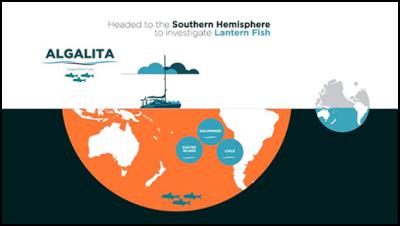Fishing for solutions to plastic in our oceans
Fishing for solutions to plastic in our oceans; all aboard the ORV Alguita

The ORV Alguita research vessel has started her voyage around the Galapagos and Easter Islands and First Mate Raquelle de Vine is already penning blogs about the problem of plastic in our oceans.
The Ara Institute of Canterbury graduate of the Bachelor of Sustainability and Outdoor Education set off from the USA on 2 November and will sail with the ORV Alguita until mid-2017. True to her training, she’s urging schools to sign up to the interactive, web-based, free programme and receive updates on the trip.
“I'm a Kiwi lass with a passion for Ocean Conservation and in particular the communication of this through education,” she says, “and I have just recently arrived in the USA, to begin an eight month expedition on the ORV Alguita, alongside Captain Charles Moore and crew, studying marine plastic pollution throughout the South Pacific, for the Algalita Marine and Research Education Organisation.
“It is an awesome opportunity to open our eyes to the issue of plastic pollution through an easy to facilitate programme, whether you want to deliver it as an extra-curricular activity, or through your subject potentially, science, geography, and/or environmental education.”
Algalita has been the foremost research organisation focusing on plastic pollution since 1999. Founder and Research Director Captain Charles Moore discovered the swirling soup of plastic debris in the Pacific’s north eastern gyre - known by many as the Great Pacific Garbage Patch. The Pacific voyage may reveal more swirling plastic.
De Vine hopes the future can be different. “Hopefully we can get New Zealand on board and start actioning change before our coastlines join the masses of others and start looking like a landfill!”
Her blogs are refreshingly imbued with kiwi-isms and her passion shines through as she explains the science and logic behind the project activities.
She writes: “We decided to focus on Lantern Fish because they are a critical part of the food chain making up 55% of the global fish biomass! If we remove lantern fish that’s like removing a major link out of a heavily loaded anchor chain. Without putting in a backup, the chain will break and the anchor will quickly sink. They’re like the canary in the coal mine in terms of understanding the impact of plastic pollution on the marine ecosystem. Conveniently, this morning Facundo and I started our 4:00 a.m. watch by deploying a manta trawl that caught eight little Lantern Fish.”
How much of a problem is plastic? Well, it is ubiquitous but hard to measure, particularly in the Southern Hemisphere and remote regions. Algalita is developing the Plastic Ocean Index to provide an effective ongoing surveillance tool for plastic pollution researchers, including citizen scientists, to manage their data geographically.
However, current estimates of plastic estimate that by 2050 the weight of plastic in the ocean is likely to outweigh that of fish.
A 2014 paper by Algalita researchers found more than 5 trillion plastic pieces weighing over 250,000 tons afloat at sea. But the organisation takes a light-hearted approach to speak to students and bring them on board with the project.
Read more about Algalita http://www.algalita.org/sp-expedition/
Check out the research blog: http://www.algalita.org/youth-education/ship2shore-blog/
Facts about plastic:
• By 2050 the weight of plastic in the ocean is likely to outweigh that of fish.
• Plastic production has increased 20 times in the last 50 years
• 5 trillion plastic bags are produced... per year!
• Just 5% of plastic packaging is recycled
• It is found inside animals throughout the ocean food chain, from mussels to sea turtles to whales
What can you do?
• Be informed
• Look out for the new generation of compostable plastic
• Re-use and repair where possible
• Avoid plastic where you can – use cloth shopping bags, bamboo toothbrushes, whatever works for you.
• Advocate for change - In Ireland they introduced a 15c plastic bag tax and reduced their usage by 90% in one year. What can you achieve at work or in your neighborhood?
The Guardian: Facts about plastic


 Pharmaceutical Society of NZ: Launch Of PSNZ Position Statement And Priority Areas Of Focus
Pharmaceutical Society of NZ: Launch Of PSNZ Position Statement And Priority Areas Of Focus Jack Yan: A Farewell To Arms Re-released, In The Form Ernest Hemingway Intended
Jack Yan: A Farewell To Arms Re-released, In The Form Ernest Hemingway Intended Baycourt Community and Arts Centre: Talofa Papa - A Celebration Of Laughter, Love And Family
Baycourt Community and Arts Centre: Talofa Papa - A Celebration Of Laughter, Love And Family Bikesport NZ: 2025 Honda New Zealand Motocross Grand Prix At Woodville - Greatest Show On Turf A Memorial Event
Bikesport NZ: 2025 Honda New Zealand Motocross Grand Prix At Woodville - Greatest Show On Turf A Memorial Event Crohn's and Colitis NZ: Camp Purple Live 2025 - Celebrating A Decade Of Fun And Friendship For Kids And Teens With Inflammatory Bowel Disease
Crohn's and Colitis NZ: Camp Purple Live 2025 - Celebrating A Decade Of Fun And Friendship For Kids And Teens With Inflammatory Bowel Disease Creative Waikato: Building Wellbeing In Social Housing Through Creative Solutions
Creative Waikato: Building Wellbeing In Social Housing Through Creative Solutions